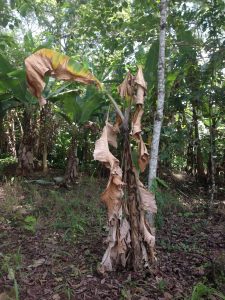
The MUSA framework includes ambitious research for globally: i) sustainable management of pests and diseases in banana (including plantain and enset) using EBCAs and plant resistance/tolerance-based IPM approaches, ii) improving EBCAs efficacy to develop bioformulations suitable for marketing, iii) improving yields of staple food or export-derived incomes, by inducing plant defenses, iv) selecting effective EBCAs-germplasm combinations, under the regional conditions of the Project, v) defining soil/plant parameters to forecast/monitor banana and enset biotic threats, vi) identifying climatic/agronomic factors affecting the banana crops and pests’ cycles and the economic success of the IPM practices tested and vii) analyzing the profitability of successful IPM strategies identified, and their social impact.
Socio-cultural and economic analyses will be performed for a broader IPM adoption, and local experiences and achievements will be disseminated through Farming Field Schools (FFS) an other media, including dissemination materials translated to local languages. Formation actions will be also implemented at high education levels.
The Project has the following specific objectives:
- Identify and select EBCAs for incorporation in existing IPM or bio-management of PPN, PD and BW.
- i) Produce knowledge on the biology of pests diseases and beneficial microorganisms, and on their life cycles on banana crops, in different regions (SSA, Canary Islands, Caribbean) with varying intensification levels. ii) Develop and apply locally adapted detection and preventive measures, to reduce incidence and spread of the cited pests and disease.
- i) Identify and test suitable germplasm resources (Musa spp. and enset cvs) susceptible/tolerant to one or more of the pests/diseases cited, to be used alone or in combination with EBCAs, to provide a first genetic basis for IPM methodologies to reduce infestation levels and pesticide applications; ii) determine banana genes and molecular pathways induced in the response to pests and pathogens.
- Set up and test novel procedures for mass production, storage and application of EBCAs by industrial stakeholders and/or local producers, tailored for application in the different regions of study, depending on local agricultural and social systems.
- Improve/sustain yields through the introduction of selected EBCAs in germplasm field assays.
- Apply microorganisms on Musa or enset germplasm, validated through field assays to draft locally adapted bio-management strategies in farming systems from SSA, Caribbean and Canary Islands.
- Identify most suitable field/crop indicators and ecological parameters to address monitoring issues for climatic threats, at the regional levels.
- Overcome socio-cultural barriers affecting adoption of new farming practices and technologies, to sustain economical banana production.


